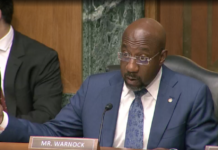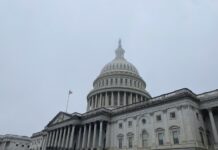
ATLANTA (GA Recorder) — Downtown Atlanta was swathed in Ukrainian blue and gold Saturday afternoon as hundreds gathered outside the CNN Center to protest Russia’s invasion of its western neighbor.
The demonstrators, part of a worldwide #StandWithUkraine movement, called on the U.S. and NATO to continue to supply armaments to Ukrainian forces and to “close the sky,” or enforce a no-fly zone over the country to protect citizens from Russian bombs.
Such a move would put U.S. and NATO forces into direct conflict with Russian fighter jets. Thousands of U.S. troops are headed to or already stationed in Europe, including from military installations in Georgia, but President Joe Biden has said their mission is to defend NATO territory, not to fight Russians in Ukraine.
Protestors, many of whom wore vyshyvankas, traditional embroidered shirts from the region, chanted slogans like “Stop the War!” “Close the sky!” and “Slava Ukraini! Heroiam slava!” (“Glory to Ukraine! Glory to the heroes!”)
Many said the protest was the first time they had been away from their televisions or computer screens in days. Georgians with ties to Ukraine used the gathering to trade information about the fighting. Many were able to rattle off the latest number of Russian casualties, destroyed tanks or downed aircraft from the latest Ukrainian media reports.
For them, the heartrending images of devastation shown in the media depict familiar places where loved ones still dwell.
“All my friends are there, all of my extended family is there, and some of them are either in the eastern Ukraine, 20 kilometers from the former border, whatever it was, or Kyiv, and both places are under heavy bombardment right now,” said Ukrainian Maria Aslam. “They are building barricades.”
“I wish I could build barricades with them,” she added. “This is all I can do in Atlanta, just stand here.”
Ukrainians in the crowd said they were keeping in constant contact with people back home through social media, which can be both reassuring and anxiety-inducing.
“My brother stays in Kharkiv, and we have our family chat, and we just exchange messages every hour. ‘Are you still alive, or not?’” said Olga Gorman, who moved to Georgia from Ukraine last year. “Five minutes ago, my brother saw a bomb next to his house. He’s still alive, but it’s terrible. This is the 21st century.”
Gorman said she cycles through a range of emotional reactions to the stress and uncertainty.
“I can see three Olgas inside me,” she said. “First Olga, she’s crying. I’m crying from time to time, like every woman, I think. The second Olga, angry. I know we will fight, we Ukrainians will fight. I am part of a few groups on the internet. I am from the IT world, and IT guys in Ukraine, they do so well. They will help to (break) Russian websites, they will help to (break) a lot of Russian banks. I can see how people help people. I can see my (local social media) group. ‘Oh, somebody needs medicine. Somebody needs food.’ Just people helping people. This is the second Olga, she’s angry, but in a good way.”
“And third, I love this one, but she doesn’t come so often, it’s time when I feel peace inside,” she added. “I try to meditate. I meditate with my group from Ukraine. And we just feel, at the same time, peace, and send peace to the world. I love this Olga, but I’m not so often in this space.”
Peace is also at the top of Victoria Carlson’s mind. She was born and raised in Belarus while it was still part of the Soviet Union and moved to the U.S. in 1994.
Carlson, who has relatives in Belarus, Ukraine and Russia, said blame for the attacks goes to Russian President Vladimir Putin and other Russian leaders, not to the Russian people.
“People everywhere are the same, people are people,” she said. “What makes the difference is who is governing them, and right now, in my opinion, we have a psychopath who is in power, who got a hold of a power, who got a hold of weapons. And I am just hoping that in the people who surround him, there are enough lucid people to see it and do something.”
Carlson said some of her Russian friends and relatives are devastated about the invasion.
“A lot of my friends say ‘I would go to a protest, but I have small children. What I’m afraid of, my children are going to be today without mom and dad. Like, what am I going to do?’” she said. “So I kind of feel it’s my duty to come and express my position here because they don’t have the opportunity to do it over there.”







